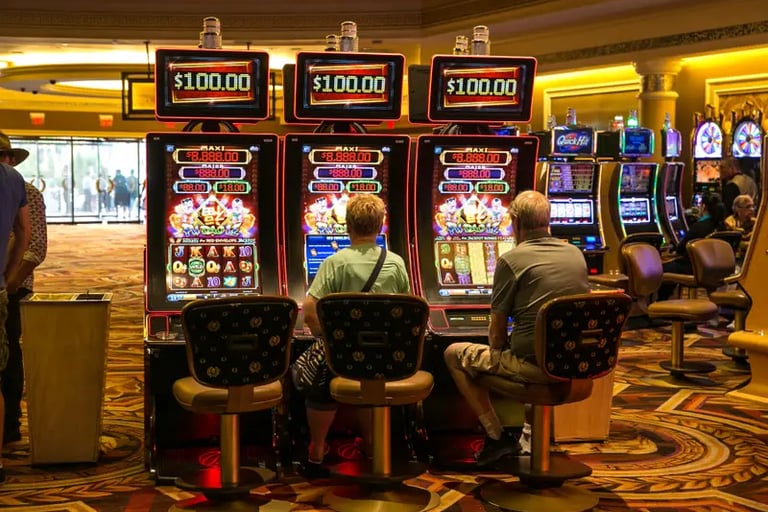“How Casinos Fool You: The Psychology Behind Gambling & How to Stay Safe”
“Discover how casinos use psychology to keep you playing. Learn their tricks, read real stories, and get tips to gamble responsibly and stay aware.”
AWARENESS
9/3/20255 min read
How Casinos Fool You: A Deep Dive into Gambling Psychology, Tricks, and Awareness
Casinos are designed to be exciting, glamorous, and fun. Bright lights, buzzing slot machines, and tables filled with eager players create an atmosphere of thrill and hope. However, behind all the glitz and glamour lies a carefully crafted psychological experience engineered to keep you playing longer and spending more. In this blog, we’ll explore how casinos fool you, weaving in real-life stories, psychological tricks, and strategies to help you stay in control. By the end, you’ll see gambling from a whole new perspective.
The Story of Raj: The First-Timer Who Lost Track of Time
Raj was a 27-year-old software engineer visiting Goa with friends. He had never stepped into a casino before, and he was fascinated by the flashing lights and upbeat music. As soon as he walked in, a friendly hostess offered him a free drink. Excited, he started playing roulette. “It’s just for fun,” he thought. But soon, hours passed, and Raj lost track of time. By the time he left, he had spent nearly his entire weekend budget.
What happened to Raj is not unique. Casinos are designed to manipulate your senses. The free drinks, lack of clocks, and immersive environment make it easy to lose control. Let’s break down the tricks casinos use to keep people like Raj playing.
1. The Psychology of Casino Design
Casinos invest millions of dollars in design and layout. They don’t just want you to visit; they want you to stay. Here’s how:
No Clocks or Windows: Casinos rarely display clocks or windows, so you lose track of time. When you don’t know how long you’ve been playing, you’re more likely to keep going.
Maze-Like Layout: Ever noticed how it’s hard to find an exit in a casino? That’s intentional. Casinos use complex layouts to ensure you pass by more games, increasing the temptation to play.
Lighting and Music: Warm lighting and rhythmic music create a sense of comfort and excitement, lulling players into a relaxed state while keeping adrenaline high.
Strategic Seating and Spacing: Slot machines are placed near entrances to lure you in. Popular games are positioned in central areas, and quieter games are tucked away, encouraging exploration.
2. The Illusion of Winning
One of the most powerful tricks casinos use is making you feel like you’re winning, even when you’re losing.
Near-Miss Effect: Slot machines are programmed to show near wins (like two matching symbols and one almost matching). Studies show near-misses activate the brain’s reward system, making players want to keep trying.
Small Wins, Big Losses: Ever noticed that you win a few dollars here and there? Casinos keep you motivated by letting you win small amounts, but overall, you’re still losing more than you win.
Compliments and Freebies: Free drinks, meals, or hotel rooms are meant to make you feel special. But these perks are tiny compared to what you spend at the tables.
The Story of Maria: The “Lucky” Streak That Wasn’t
Maria loved blackjack and once had a winning streak in Las Vegas. She thought she had cracked the game’s strategy. Encouraged, she increased her bets. Within hours, she had lost all her winnings and more. Casinos thrive on variance — the natural ups and downs of gambling — to give players hope while ensuring the house wins in the long run.
3. The House Edge: The Silent Killer
Every casino game has a built-in house edge, which is the statistical advantage the casino has over players. Here’s a breakdown:
Roulette: In American roulette, the house edge is about 5.26%. That means over time, for every $100 you bet, the casino keeps around $5.
Slots: These often have a 5–15% house edge, making them some of the worst games for your wallet.
Blackjack: Skilled players can reduce the house edge to 0.5%, but the casino still makes a profit in the long run.
Casinos don’t need to cheat; math is on their side. Over time, they always win.
4. Why Gambling Feels Addictive
Casinos use psychological conditioning similar to how social media apps keep you scrolling.
Variable Rewards: Slot machines don’t reward you every time. They work on a “variable ratio schedule,” which is the same principle behind addictive behaviors. You never know when you’ll win, so you keep playing.
Dopamine Rush: Winning a small amount releases dopamine, the “feel-good” chemical. The brain craves that feeling, leading to compulsive play.
Peer Pressure: Seeing other people win creates a false sense of possibility. Casinos even place “big winner” signs to fuel excitement.
The Story of Arun: When Fun Turned into Addiction
Arun started gambling as a hobby after work. At first, it was harmless, but soon, he began chasing his losses. He borrowed money to gamble more, believing he could win it back. Within months, he was in debt. Arun’s story highlights how quickly casual gambling can spiral out of control.
5. Online Casinos: The Trap in Your Pocket
With smartphones, casinos are no longer physical spaces; they’re in your pocket. Online gambling platforms use even more advanced techniques:
Push Notifications: Remind you of bonuses or free spins to pull you back in.
Gamification: Leaderboards, badges, and rewards keep you engaged.
24/7 Access: There are no closing times online, making it easy to play anytime.
Online casinos often offer attractive welcome bonuses, but these come with wagering requirements that make cashing out almost impossible.
6. How to Outsmart Casino Tricks
You can enjoy gambling without falling for the traps. Here’s how:
Set a Budget: Decide how much you’re willing to lose before entering a casino.
Time Management: Set alarms on your phone since casinos won’t show you clocks.
Avoid Chasing Losses: Once you hit your limit, walk away.
Stick to Low-House-Edge Games: Blackjack and baccarat give you better odds than slots or keno.
Take Breaks: Casinos thrive on keeping you seated; step away regularly.
7. When to Seek Help
If gambling is causing financial stress, emotional issues, or strained relationships, it’s time to reach out for help. Here are some resources:
National Helpline (India): +91-9820466726
Therapy Apps: Apps like BetterHelp offer counseling.
Admitting you have a problem is the first step toward recovery.
Conclusion: Knowledge is Power
Casinos are not inherently evil, but their primary goal is profit, not your entertainment. By understanding their tricks, you can enjoy gambling responsibly without falling into their traps. Raj, Maria, and Arun’s stories remind us that anyone can get caught up in the thrill. Awareness is your best defense.
Next time you step into a casino — or open a gambling app — remember: the house always wins, but you can choose when to walk away.




© 2025. All rights reserved.
Follow us
Quick Links


